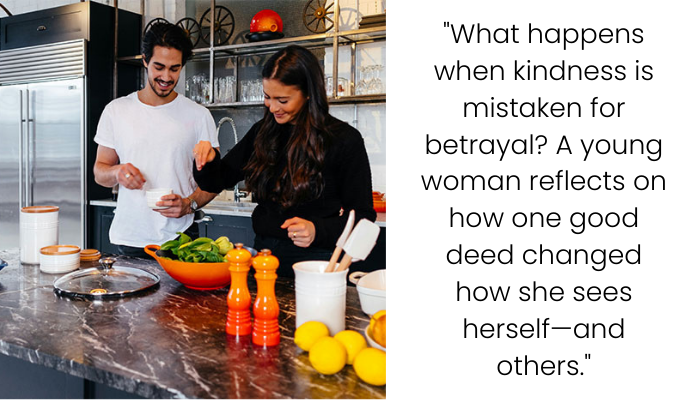I Made Dinner for My Coworker’s Kids—Now His Wife Thinks We Had an Affair
Sometimes, doing the right thing comes with consequences you never expect. A 25-year-old woman shared how one act of kindness completely shook her sense of identity and boundaries.
It started when her coworker, Matt, was left on his own to care for three kids after his wife, Mary, had to suddenly leave the country for a family emergency. Matt was drowning—full-time job, school drop-offs, grocery runs, cooking, everything piling up at once. Out of pure kindness, she stepped in. With her catering background, she offered to handle weekly dinners and do the shopping. Simple support, nothing more.
But support slowly turned into something more personal. Matt’s 12-year-old son began helping her in the kitchen, learning recipes, and even sharing their little cooking adventures online. What felt like a sweet, family-style bonding moment quickly turned sour. Mary saw the posts and immediately assumed the worst—that her husband was having an affair with the woman just trying to keep their household from falling apart.
The truth eventually came out. The misunderstanding was cleared, apologies were exchanged, but the damage was already done. For the narrator, this wasn’t just about gossip or misplaced suspicion—it left emotional scars. She started questioning her own boundaries, her sense of self, and even her natural instinct to help others. Now, every interaction feels like walking on eggshells, worrying how her actions might be perceived.
This isn’t just a story about one misunderstanding—it’s about how fragile trust and perception can be in relationships, especially under stress. It also highlights the struggles of sudden single parenting, co-parenting challenges, and the messy overlap between work life and personal life. For anyone who’s been unfairly judged while trying to help, the lesson stings: kindness is powerful, but protecting your emotional boundaries is just as important.
This woman wanted to help her coworker’s family with their chores

But it looked a little different in their photos on social media














When Good Deeds Get Misread — Navigating Boundaries, Gender Roles & Emotional Fallout at Work
Sometimes, even the kindest intentions can backfire. This story isn’t about betrayal or manipulation—it’s about how care, gender expectations, and fragile trust can collide in messy, very human ways.
🧠 Emotional Labor & Gendered Double Standards
Helping someone out at work should be simple, right? But research shows it’s not. Sociologist Arlie Hochschild talks about emotional labor—all the unseen effort women often carry to keep things running smoothly, whether in families or workplaces.
In this case, the woman stepped in to help a struggling coworker with meals and support for his kids. But instead of being seen as kindness, it was misread as something more. And here’s the kicker: if a male coworker had done the exact same thing—helped with shopping, cooked, or mentored a child—people probably wouldn’t have jumped to “affair.” That’s the double standard. Studies in the Journal of Social and Personal Relationships even show that cross-gender friendships in the workplace are often judged more harshly when one person is married.
This highlights a bigger issue: workplace boundaries, gender bias, and how society still struggles with men and women being “just friends.”
🔥 Stress, Grief & Fragile Trust in Relationships
Mary’s reaction wasn’t really about the food or the social media posts—it was about grief and fear. She was away dealing with a family emergency, carrying the heavy emotional load of grief triggers and separation stress. Psychologists explain that during times like this, even small things—like a Facebook post or an innocent photo—can spiral into fear of betrayal.
For couples, distance plus stress often magnifies insecurity. What Mary saw wasn’t just a woman helping—it looked like emotional replacement. And when trust is already shaky, even good deeds can look suspicious. This is where relationship counseling, grief therapy, and stress management strategies can help couples find stability again.
🚧 The Aftermath: Self-Doubt & Moral Injury
For the woman who helped, the fallout was brutal. What she felt wasn’t just embarrassment—it was moral injury. That’s the term experts use when someone feels punished or misunderstood for trying to do the right thing. Caregivers, social workers, and even healthcare providers often deal with this. Now, she finds herself second-guessing every act of kindness, worrying about optics, and shrinking back from offering help.

This kind of emotional fallout isn’t paranoia—it’s self-protection. It’s the mind’s way of saying: don’t get burned again.
🫂 Healing, Boundaries & Moving Forward
So, how do you recover from being misjudged? Experts suggest a few things:
- Therapy or counseling to unpack the guilt and frustration.
- Journaling or writing as a way to process without self-censoring.
- Support groups or workplace wellness programs where empathy isn’t seen as weakness.
- Most importantly, setting clear boundaries so kindness doesn’t turn into burnout or suspicion.
At the end of the day, being misunderstood doesn’t erase the good you did. Sometimes doing the right thing doesn’t bring thanks—it brings bruises. But that doesn’t make it wrong.
A lot of people who read the story shared their thoughts on what happened as well








